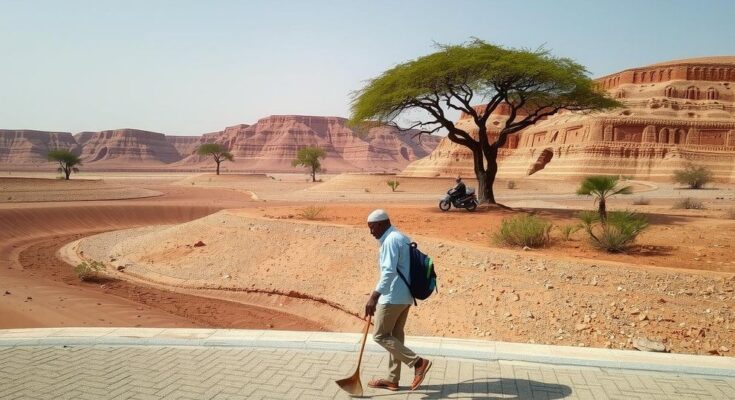The Sahel region is experiencing severe flooding due to torrential rains, displacing millions and inundating extensive cropland. Political instability from military coups in countries like Burkina Faso, Mali, and Niger has hampered governance and climate adaptation efforts, while international isolation limits climate finance access. Community empowerment and sustainable practices are essential to build resilience amid these challenges, despite the slow progress hindered by funding gaps and governance weaknesses.
Amid devastating flooding caused by torrential rains in the Sahel region, countries like Burkina Faso, Chad, Mali, Niger, Nigeria, and Sudan are grappling with the impacts of climate change. The rainy season, which occurs from July to September, has displaced millions and submerged vast areas of cropland. Concurrently, military coups in Burkina Faso, Mali, and Niger have disrupted governance and climate adaptation efforts, compounding the challenges faced by communities. Political isolation from Western nations and limited access to international climate finance have further hindered recovery efforts and initiatives geared toward sustainability.
Organizations such as the Sahara and Sahel Observatory (OSS) advocate for empowering local communities through sustainable practices like agroecology and water user associations, which are vital in promoting resilience. Despite the Sahel’s potential for renewable energy and agricultural development, political instability impedes progress. For instance, Mali recently experienced the heaviest rainfall in over fifty years, leading to severe damages and risking public health. Housséini Ouedraogo, a director at Mercy Corps, highlights that the region’s recovery from these disasters will be long and arduous.
The Sahel, characterized by its semiarid climate and reliance on agriculture, faces increased vulnerability due to climate change, with experts emphasizing the need for robust governance frameworks. The recent military governance in Niger, Mali, and Burkina Faso has disrupted climate adaptation projects, forcing communities to navigate these challenges with diminishing international support. Conversely, nations like Chad and Mauritania, although influenced by military governance, have succeeded in creating coherent climate policies.
Efforts to secure international climate funds remain difficult for Sahelian governments due to their limited institutional capacity and the ongoing political crises. Community-based adaptation initiatives are critical, enabling local knowledge to inform sustainable practices, such as managing shared water resources through Water User Associations. Regional cooperation and partnerships with non-Western allies are emerging, yet these often emphasize military or economic cooperation over climate resilience.
The OSS plays an integral role in helping Sahelian countries gain access to international climate funding; however, profound governance improvements are necessary for effective climate action. Finally, infrastructure investments and regulatory reforms could facilitate the transition to renewable energy sources like solar power, ultimately fostering a more sustainable future for the Sahel amid ongoing political challenges.
The Sahel region, located just south of the Sahara Desert, is increasingly vulnerable to climate change, characterized by extreme weather patterns, including droughts and severe flooding. The region’s reliance on agriculture means that millions depend on stable weather conditions for subsistence. Recent military coups in several Sahelian nations have further complicated governmental capacities to adapt to these changes, leading to diminished access to international support and hindering climate resilience efforts. Initiatives promoting sustainable practices through local community engagement are crucial for building resilience against climate change while addressing political instability.
In conclusion, the Sahel region faces growing challenges due to climate change exacerbated by political instability. While community-based adaptations and local engagement offer pathways to resilience, significant improvements in governance and international cooperation are necessary to address climate vulnerabilities effectively. The unique dynamics in nations like Niger, Mali, and Burkina Faso illustrate the need for tailored approaches that can integrate climate considerations with broader developmental goals. Overall, the interconnected crises of climate change and political governance must be addressed holistically to ensure sustainable futures for the affected communities.
Original Source: news.mongabay.com




